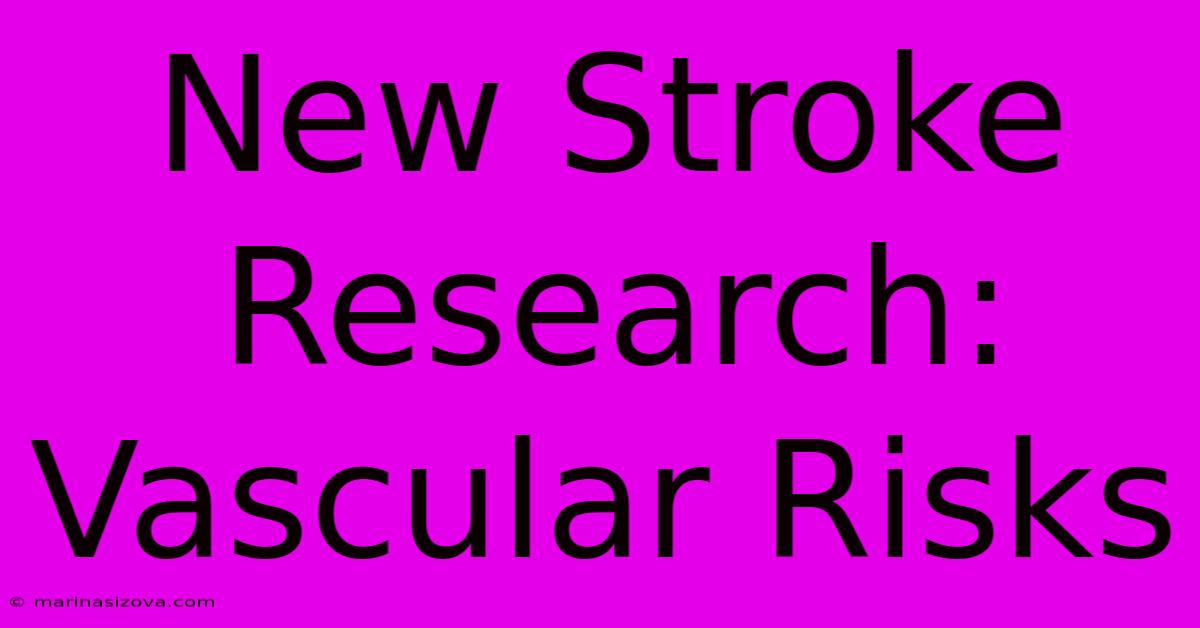New Stroke Research: Vascular Risks

Discover more detailed and exciting information on our website. Click the link below to start your adventure: Visit Best Website. Don't miss out!
Table of Contents
Unveiling Stroke's Vascular Secrets: New Research & Insights
Is stroke solely a neurological event, or are vascular risks the key? New research strongly suggests that understanding and managing vascular risks is paramount in stroke prevention and recovery.
Editor's Note: This comprehensive guide on new stroke research focusing on vascular risks was published today. Understanding these risks is crucial for public health and individual well-being.
This topic is vital because stroke remains a leading cause of death and disability worldwide. A thorough grasp of the underlying vascular factors can significantly improve prevention strategies and treatment outcomes. This review summarizes recent findings on vascular contributions to stroke, encompassing risk factors, diagnostic advancements, and therapeutic implications. Semantic and LSI keywords like cerebrovascular disease, atherosclerosis, hypertension, atrial fibrillation, carotid stenosis, blood clots, antiplatelet therapy, statins, and lifestyle modifications are discussed.
Analysis: This analysis draws from a synthesis of recent peer-reviewed studies, clinical trials, and expert consensus statements focused on the vascular aspects of stroke. The goal is to present a clear, concise, and informative guide for healthcare professionals and the public alike.
| Key Discoveries Regarding Vascular Risks in Stroke | Description |
|---|---|
| Emerging Risk Factors | Identification of novel risk factors beyond the established ones. |
| Advanced Imaging Techniques | Improved visualization of vascular damage and plaque formation. |
| Targeted Therapies | Development of new drugs and interventions focused on vascular mechanisms. |
| Lifestyle Interventions | Emphasis on preventive measures through diet, exercise, and smoking cessation. |
Vascular Risks in Stroke
Introduction
This section highlights the critical role vascular health plays in stroke pathogenesis and management. Understanding the interplay of various vascular risks is essential for effective prevention and treatment strategies.
Key Aspects
- Atherosclerosis: Hardening and narrowing of arteries.
- Hypertension: High blood pressure.
- Atrial Fibrillation: Irregular heartbeat.
- Carotid Stenosis: Narrowing of carotid arteries.
- Blood Clot Formation: Thrombosis and embolism.
Atherosclerosis: The Foundation of Many Vascular Risks
Introduction
Atherosclerosis, the underlying cause of many cardiovascular diseases, is profoundly implicated in stroke. Its impact on cerebral blood flow is central to the development of ischemic stroke.
Facets
| Facet | Explanation |
|---|---|
| Role in Stroke | Plaque buildup restricts blood flow, leading to ischemia and potentially stroke. |
| Examples | Carotid artery stenosis, atherosclerotic plaques in the intracranial arteries. |
| Risks & Mitigations | Risk factors include smoking, high cholesterol, and hypertension; mitigation strategies include lifestyle changes and medication. |
| Impacts & Implications | Significant impact on stroke risk and severity; effective management is critical for stroke prevention. |
Hypertension: A Silent Threat
Introduction
Hypertension, often asymptomatic, significantly elevates stroke risk by increasing shear stress on blood vessel walls and promoting atherosclerosis.
Further Analysis
Elevated blood pressure accelerates the progression of atherosclerosis, rendering individuals more susceptible to both ischemic and hemorrhagic stroke. Effective blood pressure management through lifestyle modifications and medication is crucial in reducing stroke risk.
Closing
Addressing hypertension is vital for preventing stroke. Regular blood pressure monitoring and appropriate medical intervention are key components of comprehensive stroke prevention strategies.
FAQs on Vascular Risks and Stroke
Introduction
This section addresses common queries regarding vascular risks and their relationship to stroke.
Questions & Answers
| Question | Answer |
|---|---|
| What are the main vascular risk factors? | Atherosclerosis, hypertension, atrial fibrillation, carotid stenosis, diabetes, smoking, and hyperlipidemia are major risk factors. |
| How are vascular risks diagnosed? | Physical examination, blood tests, electrocardiogram (ECG), carotid ultrasound, and brain imaging techniques (CT, MRI) are commonly used. |
| Can vascular risks be managed or prevented? | Yes, through lifestyle changes (diet, exercise, smoking cessation), medication (statins, antiplatelet agents, antihypertensives), and regular monitoring. |
| What are the long-term implications of stroke? | Long-term effects can include physical disability, cognitive impairment, speech problems, and emotional challenges. |
| What is the role of genetics in vascular risks? | Genetic predisposition plays a role, influencing susceptibility to atherosclerosis, hypertension, and other vascular conditions. |
| Where can I find more information on stroke? | Reliable sources include the American Stroke Association, the National Institutes of Health, and reputable medical websites. |
Tips for Reducing Vascular Risk and Stroke Prevention
Introduction
This section offers practical strategies to minimize vascular risks and lessen the likelihood of stroke.
Tips
- Maintain a healthy diet low in saturated fat, sodium, and cholesterol.
- Engage in regular physical activity.
- Quit smoking.
- Manage blood pressure and cholesterol levels effectively.
- Control diabetes.
- Maintain a healthy weight.
- Limit alcohol consumption.
- Consult your physician about appropriate medication.
Conclusion: A Holistic Approach to Stroke Prevention
In Summary: This exploration of new stroke research emphasizes the critical role vascular risks play in stroke pathogenesis. Understanding the mechanisms underlying these risks allows for more effective preventive measures and treatment strategies.
Looking Ahead: Continued research focusing on novel vascular risk factors, advanced diagnostic tools, and targeted therapies will be vital for reducing the burden of stroke globally. A holistic, preventative approach that integrates lifestyle modifications with medical interventions holds the greatest promise for mitigating stroke risk and improving patient outcomes.

Thank you for visiting our website wich cover about New Stroke Research: Vascular Risks. We hope the information provided has been useful to you. Feel free to contact us if you have any questions or need further assistance. See you next time and dont miss to bookmark.
Featured Posts
-
Supermarket Christmas Mince Pies Taste Test
Nov 24, 2024
-
Premier League Arsenal Nottingham Livestream
Nov 24, 2024
-
Heimsieg Bvb Beier Ueberzeugt
Nov 24, 2024
-
Utrecht Verslaat Psv Ajax Koploper
Nov 24, 2024
-
Youth Coach On Shabalalas Role
Nov 24, 2024
